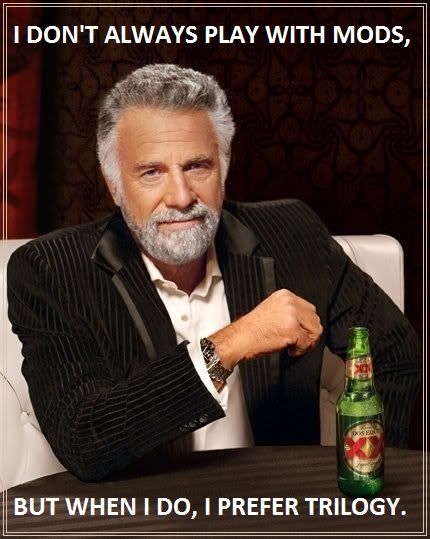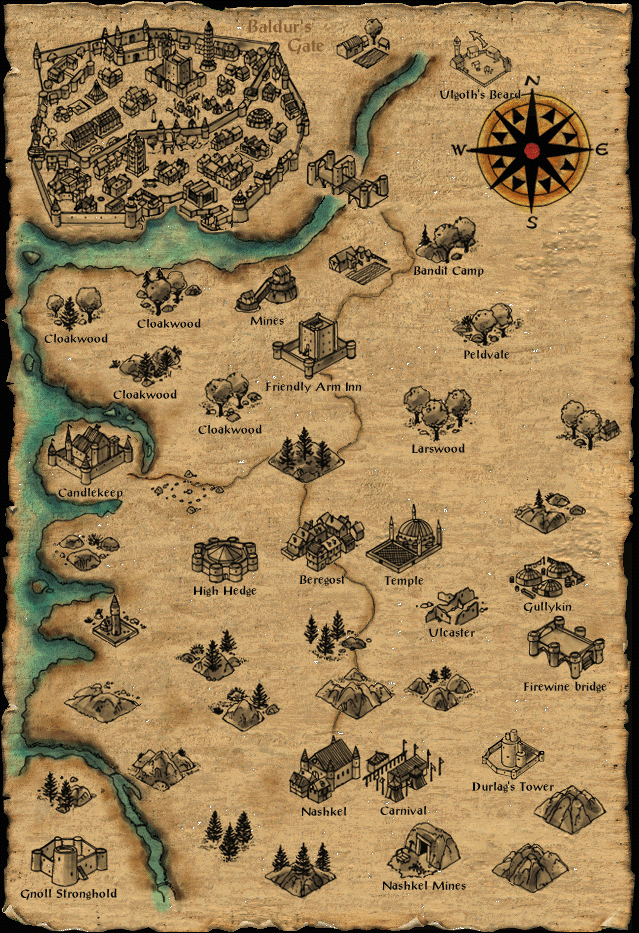*casts Greater Wall of Text*
Why would I want to "solve" anything? Was there a problem to "solve"?
If something isn't a tool for solving some problem and doesn't serve to improve the setting or the atmosphere, then it's spurious shit that gets in the way.
Alignment system is something that shouldn't be in D&D in the first place.
Biography is a one time thing.
Alignments can be observed during play and used as a reminder.
Not biography. Character's description giving GM something to hang on to when evaluating whether the player is successfully staying in character or not.
Alignment system is effectively pointless mechanical insert between player's human-level idea of their character and GM's human level evaluation of their actions. It serves no purpose but to open way for lazy, derpy shit.
Trait systems like GURPS can lead to monsters even more horrible than any one made by alignments.
That wholly depends on trait system in question and its trait set.
Traits are much easier to codify with mechanical consequence than nebulous concepts of good or evil.
Alignments neither let you have your cookie nor eat it.
I think a question if LG planetar is still LG if he taken his LGness to absolute (by opening portal to hell) or is evil nighthag is still evil if she sits around labyrinth thinking of her scarred immortal boyfriend just makes it more interesting. Companion alignments in PST are also great touch and spice things up. Like Morte is one curious CG of a kind.
It's a question used to deconstruct the alignment system and yes, it makes PS:T more interesting - by deconstructing the alignment system.
By the way, here is a treatment of the Planes and alignments thats much more interesting (and adult) in my view:
http://forum.rpg.net/showthread.php?625619-Planescape-without-alignments-(long)
Could be somewhat interdasting.
Might be true, dunno. Not for me though, I remember having lots of trouble with spellcasting opponents in BG1, at least without metagaming. These fights always turned into a mess if I didn't force them to waste their spells on summoned cannon fodder.
Scouting ahead with thief hiding in shadows isn't metagaming, yet it fucks up BG1's gameplay royally (scout, retreat, justified and tactically sound preemptive fireball/stinking cloud opener on known enemy position - problem, "I don't work unless withing party's FoV" AI?).
As for spellcasters, they were either trivial, randumb or metagame-y in BG1, relying either on no-brainer bakcstab from shadows/disruption with M&Ms/acid arrow, concentrated barage of ranged attacks in hope that at least one of them hits, or knowing exactly which protections to employ beforehand.
Colourful squigglies during casting were somewhat helpful in discerining threat but not in themselves sufficient.
]
learning by doing leveling (which is no option for a party based game).
Wizardry 8.
Or maybe the Elder Scrolls games prove that true sandbox games just cannot into engaging storytelling
They shouldn't really try in the first place. Player can fuck up any elaborate storyline in a sandbox game and NPCs' primary purpose is creating illusion of their place in the gameworld and providing wide variety of information if asked, not being interesting conversation partners.
Morrowind succeeded in those regards, it also moved much of elaborate and engaging storytelling into the past, as backstory is impervious to player's meddling - and kudos for that.
Daggerfall was uneven - on one hand good story, politics, scale, and individual immersive and complex mechanics, OTOH everything was sort of disjoint and separated from each other, most quests were just differening facades for sending you to X to find Y and do Z with it and so on.
Very ambitious, but I overall rate Morrowind higher because it was more to it than sum of its parts, while DF was just sum of it's parts, even though nearly all those parts were individually greater (for example both chargen and enchanting were the stuff of legends).
In any case Morrowind trumps BG1 in every imaginable area short of party gameplay and possibly music - C&C, setting, story, atmosphere, exploration, lore, everything.
Even combat is arguably less shitty than in BG1 because at least you don't have to babysit six braindead lemmings and have more influence on not dying randumbly at low levels.
Those names are actually pretty cool in fantasy terms. No idea why to criticize them. Compared to modern "cRPG's" these are outstanding.
Isabela, Anders, Aveline, Fenris, Bethany, Sebastian, Merrill, Varric? I would better take BG 2 companions names.
Ok, the problem is with me then.
I like fantasy that is more grounded somehow, like Skyrim and its names that at least sound nordic or something, or Arcanum with its Virgils and Magnus and Cynthias and Joaquims and Thorvalds and Sebastians, and King of Dragon Pass with its pseudo-saxon names, etc.
The traditional high-fantasy aesthetic always sounded too butterflyesque / faggy to me.
True dat. For example TES has racial/cultural naming conventions it sticks to.
Although...
Yeah, that's just different style. Also, it's not Baldurs Gate phenomena, because they used it in AD&D campaigns a lot. Can't really imagine a huge dwarf(lol) named Johnathan or epic Thayan mage called Rick.
So I guess BG names are ok.
Nothing to write home about but not actively irksome either.
They could at least have tried. Like calling him Martinus to stay with the Roman theme of the empire. But no...
Oblivion was the game where no one tried.
A massive condensed pile of pure awful that should stand forever as a reminder of what happens when people don't even try.
Fixed.
Sapkowski is quite known for just taking all sorts of

random shit when inventing his fantasy names.

I give up on Baldurs Gate 1. Im not having any pleasure at all playing this. The story is bland and uninteresting
If it's any consolation it gets a bit better some 4/5 - 5/6 in.

the "exploration" consists of lighting large squares in search of enemies to kill (through boring combats) and loot. NPCs are shallow, and the dialogues are passable. It must be the most overrated game ever.
Yes.
At least that side of Oblivion.
By the way, I think that from a game design POV, Baldurs Gate was released at a bad time, because it got obfuscated (again, game design wise) by Fallout and its groundbreaking interactive-reactive environment that makes the kind of combat-focused environment in Baldurs Gate and most others that preceded it look shallow and unidimensional in comparison. I mean, by the time folks at Bioware were developing BG, the zeitgeist checklist for crpgs should look like:
- cool sleeping animated sequences
- NPCs with (some) personality
- cool spells gfx and effects
- portrayal of actual tabletop systems (like D&D)
- etc.
and then comes Fallout and the zeitgeist changes radically to:
- reactive environment that actually changes and responds to your behaviour like an alive and breathing world
- choice & consequence
- multiple ways to succeed at quests
- viables ways for playing the game aside from pure combat
- multi-branching central plot
- etc.
Its like Baldurs Gate was Daikatana and Fallout was Half-Life. The difference is that Daikatana didnt have the legions of D&D fans to support its godawful final product.

Yep it's a total corridor shooter
Oblivion must be the least linear game ever, 111/10 GOTM.
Baldurs Gate is linear, because you cant change the way the story unfolds no matter what. Compare this to Fallout and see the difference.
.
Well, baldurs gate is interesting in the way that it never left me frustrated because i didnt get to do what i wanted, all the time i felt like i was moving forward on my own volition and motivations, didnt matter if i was playing an evil motherfucker or an angel. It didnt feel linear because most of the time i could just set my own goals and solve the things in my own way, and while its true that the end is the same no matter what you do, it comes across as a natural conclusion to it, that is decent writing.
At the same time the feel of the game changed depending on what kind of character i was playing, just because of those limited times were your input matters. It doesnt take replays nearly as well as fallout does tho.

<--click
Not necessarily, what you'd have would be one choice in affecting the plot. The main quest would be non-linear if either parts or the whole of it could happen in different orders. Simply being capable of skipping the Nashkel mines would allow you to skip one of the Main Quest's chapters. Linearity is a word best used for quest structure. Even if you could skip the majority of the main quest a la Morrowind, you still wouldn't change the fact that the main quest is mostly linear. Though I don't think anyone here would call Morrowind a linear game.
I'd say that
the game's linearity is a function of how well you can express the game's content as a linear sequence of events without losing stuff in translation.
Just skipping stuff or doing stuff in different order without one task influencing the other doesn't make the game less linear in this sense and BG is pretty fucking linear in this regard - other than some exceedingly minor C&C in some sidequests and encounters it pretty much has no nonlinearity to speak of.
OTOH if you take Morrowind you not only have ability to skip stuff, but you get huge, mutually exclusive chunks of optional content (great house questlines, vampiric clans, FG fork), minor decision forks in some quests, alternative quest entry points, instrumental decisions altering how a quest plays out even without changing the ending (for example disguising yourself as an ordinator when infiltrating the Ministry of Truth if you're humanoid, ability to replace one of great house hortator sub-questlines with your respective great house faction progression, ability to replace all of hortator/nerevarine sub-questlines with any sequence of side- and faction quests raking you enough reputation, backpath giving you its own separate content, and so on.
Morrowind, while not a paragon of nonlinearity and C&C by any means, still has quite a lot of it.
This, some people simply prefer (in general or are simply sometimes in the mood for) low level adventure feel of BG1, being in grave danger from a single wolf, arrow or magic missile when you start out, being ecstatic when you finally gather enough money to buy a full plate or when you find even a mundane +1 sword (further emphasized in BG1 due to normal weapons having a tendency to break for plot reasons)
Too bad everything else is shit to meh.
They couldn't really let you tackle the story areas in any order because they're balanced for different xp totals. A better solution might have been to introduce multiple ways to find the location of the bandit camp, and then another alternative to exploring the cloakwood mines.
A *good* solution would be different hooks (Jaheira and Khalid, Xzar and Motaron, etc.) driving you in different directions, and stuff happening meanwhile in locations you don't visit.
Instead of following chain of similar evil bad NPCs you'd get to one of them, while the other would make some scripted move (or have scripted move made against them) meanwhile.
For example you might get pointed towards bandit Camp, Cloakwood, or Nashkel, learning different parts of the plot and getting different loot and party members in the process.
It would also shorten the derpy and dragged out quest chain before you get framed and plot finally starts to move on.
The game doesn't really need that stuff, though. BG1 has more in common with sandbox RPGs than with Fallout; the journey is more important than the destination.
I'd say Fallout has quite a lot in common with sandbox RPGs, it's just that unlike BG1 it's done well.







![The Year of Incline [2014] Codex 2014](/forums/smiles/campaign_tags/campaign_incline2014.png)


















![Glory to Codexia! [2012] Codex 2012](/forums/smiles/campaign_tags/campaign_slushfund2012.png)


 's to my fellow Baldur's Gate Trilogy bros.
's to my fellow Baldur's Gate Trilogy bros.

 random shit when inventing his fantasy names.
random shit when inventing his fantasy names.


 .
.

